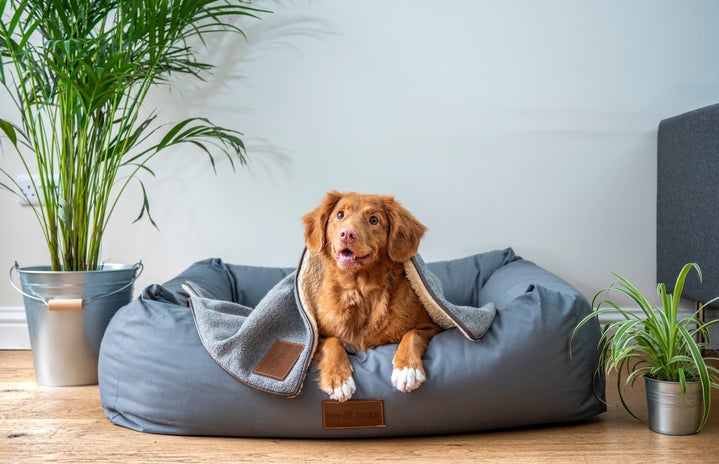There’s no better companion than a furry friend, especially during a pandemic (when it’s so easy to feel alone). Bringing a dog into your life can be extremely rewarding and beneficial to your mental health. Having another living, breathing thing to take care of can provide a sense of motivation and purpose. But raising a fur baby is also a huge responsibility and can quickly become frustrating and overwhelming if you’re not prepared. Here are some things to consider before you bring your new best friend home.
Breed and Age
The first thing you should do before getting a dog is decide on an age and breed that works best for your current lifestyle. Every breed has a unique temperament and energy-level. It’s also important to consider size and how that fits with your living situation. If you live in a small apartment, a Great Dane probably isn’t the best option for you. The age of the dog is another important factor.
Are you ready to make the commitment to a puppy? Or would you rather adopt an adult dog that already has a basic training foundation? Or perhaps you want to adopt a senior dog and give them an improved quality of life. Before making any final decisions, make sure you’re knowledgeable about the breed and life-stage of the pup you’re bringing home so you know what to expect.
Potty-Training
One of the most stressful times in any dog-parent’s life is the potty-training phase. It’s important to come up with a plan for your new dog. If you’re bringing home a puppy, they’re probably not going to have any house training experience. You’ll need to establish a schedule and routine to guide them. It’s helpful to do research on different methods and decide which one will work best for you.
Are you going to use puppy pads or teach them to go outside? Do you have a fenced-in yard or are you going to take them out on a leash? It’s important to reinforce good behavior, so when they go to the bathroom in the ideal spot, make sure to praise and reward them with treats.
It’s also important that you go easy on them–and yourself. There are going to be accidents. And it’s not going to be your fault or theirs. Potty-training can take up to a year for some dogs. You have to be patient and consistent, and eventually they will understand. Don’t give up!
To Crate or Not to Crate?
Crates are a hot topic in the dog-training world. There are conflicting opinions, but the research tends to show that it’s a great tool if used correctly. As long as it is not used as a source of punishment, crates can help prevent separation anxiety, aid in quicker housetraining, and keep your pet safe when you’re not home to watch them.
I suggest doing lots of research on the benefits of crate-training and the proper ways to use a crate before introducing it to your dog. There are hundreds of informative YouTube videos and articles on the web that can teach you everything you need to know about crate-training. (I recommend watching Rachel Fusaro and Zak George on YouTube for tips on all things dog-related)
Choosing a Diet
Perhaps the most difficult decision of all is choosing which diet is the best fit for your pup (and your budget). No matter how much you research it, there is no general consensus on what the best dog food is. It’s crucial that you do your own research and decide what will work best for you and your dog. Raw-diet or kibble? Freeze-dried or canned? Homemade, store-bought, or subscription service? Grain-free or grain-inclusive? The options are endless and there is no right answer. After doing your own research, make an informed decision on what you think is the best option. (Check out https://www.dogfoodadvisor.com/ for reviews and ratings)
behavior training
In addition to potty-training and crate-training, there are several other behaviors you will have to teach your dog. It’s important to research tips for modifying unwanted behaviors to make living with your new pet as enjoyable as possible.
If you live on a busy street, it would probably be stressful to have a dog that barks every time a car drives by. Or if you plan to take your dog on walks, they have to learn how to walk on a leash. There are also behaviors you should consider teaching your dog in order to keep them safe. Recall and coming when their name is called could be a life-saving skill. Teaching them to “drop it” could also be life-saving if they put something dangerous in their mouth.
Think of all the things you would like your dog to be able to do and learn the best ways to shape and reward those behaviors. If you don’t have feel confident in your training abilities, there is always the option to take your dog training classes or hire a personal trainer.
hEALTH AND SAFETY
No matter what age your dog is when you bring them home, you want them to have the longest life possible. It is absolutely crucial that you research ways to keep your dog safe and healthy. Find a reputable vet in your area before bringing your pup home and make sure they are up-to-date on all vaccinations.
Talk to your vet about flea, tick, and worm prevention options to protect your dog. Make sure you schedule routine check-ups and exams to keep an eye on their health. Keep a folder of all their vaccination and medical records to have on hand for vet appointments.
If you’re concerned about finances and paying for medical bills, look into pet insurance or vet payment plans to help cover costs. The best (and most cost-effective) method of protection is prevention. Educate yourself on what is toxic to dogs and make sure they are out of reach. Countless foods, plants, and household items could be deadly if your dog ingests them. It’s also a good idea to make sure you know where the nearest emergency veterinary hospital is (you never know when you’ll need make an unexpected trip there). Having a sick or injured dog is scary, but you can ease some of the anxiety if you are educated and prepared.
Commitment and Time management
And lastly, the MOST important thing to consider before getting a dog is the amount of time you will need to dedicate to them. Dogs are companion creatures and it’s important that you set aside enough time every day to not only meet their basic needs, but also to play and bond with them.
If you work a full-time job and go to school, take that into account. Dogs need to be fed, exercised, and trained–and all of those things take time out of your day. Your social life will likely be impacted by your new responsibilities. You may not be able to go out as often or spend as much time with friends.
It’s going to be more difficult to travel and sleep away from home. You’re going to have to plan around your dog’s bathroom and feeding schedule, ensuring they are never alone for more than 8 hours at a time. You also need to consider the commitment you are making. If you are getting a puppy, you’re signing up for a 10-15 year commitment. If you’re not ready for something so long-term, but still crave the companionship of a pet, consider adopting a senior dog. You might not get as many years with them, but the time you do have will be just as rewarding.
If you do decide to bring a new furry friend into your life, you are in for a journey full of love and happiness. There is nothing more comforting than coming home after a long day to a dog that’s excited to see you and loves you unconditionally.


